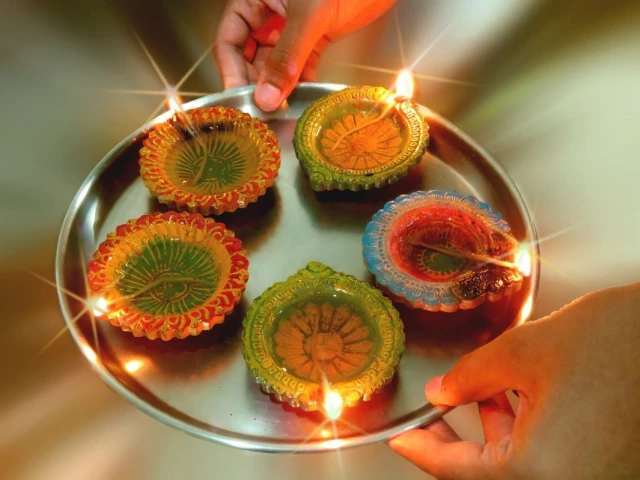Families gather for pooja, rangoli and festive rituals as temples dazzle with lights
Traditional lamps to light up Diwali celebrations. PHOTO: PIXABAY
The Hindu community in the twin cities of Rawalpindi and Islamabad celebrated diwaliThe festival of lights, on Monday, with joy and devotion.
As the Krishna Mandir in Saddar, Rawalpindi is still under construction, the main celebrations were held at the Gracey Line Mandir and the historic Lal Kurti Mandir.
Families, decked out in vibrant traditional attire and carrying trays lit up with diyas (oil lamps), enthusiastically participated in the evening’s festivities with deep religious fervour.
Sweets were happily distributed and prasad shared as the festivities began at 17.00 and continued until late at night. The ceremonies featured the singing of devotional hymns and special prayers for the peace, prosperity and progress of Pakistan.
Read also: Zardari, Shehbaz, celebrates diwali with messages of unity, light, respect
Diwali, one of the most significant festivals in the Hindu religion, symbolizes the triumph of good over evil, light over darkness and knowledge over ignorance.
Traditionally, homes are decorated with glow diyas and colorful rangoli patterns made from rice flour and flowers. People wore new clothes, exchanged sweets and gifts with friends and family, worshiped their gods and celebrated the festival with fireworks.
The origins of the festival are rooted in Lord Rama’s return to Ayodhya after 14 years of exile, accompanied by his wife Sita and brother Lakshman. For Hindus, Diwali is also associated with Goddess Lakshmi, the deity of wealth and prosperity, who is welcomed into homes on this auspicious occasion.
Temples were beautifully lit up with multicolored lights, vibrant buntings and large oil lamps, creating a striking festive atmosphere. Households were similarly adorned with candles, diyas and decorative lights, while elaborate rangoli designs – a central element of diwali – adorned floors.
speaks to Express PakinomistSardar Heera Lal, president of Pakistan Hindu-Sikh Welfare Council, said that diwali brings together families, relatives and friends to share happiness and strengthen bonds of love and harmony. “The essence of diwali lies in spreading devotion and brotherhood,” he remarked.
Lal explained that in the days leading up to the festival, homes are renovated and repainted. On Diwali evening, diyas are lit both indoors and outdoors – in courtyards, windows and streets – while special prayers are offered to Goddess Lakshmi.
Om Prakash Narain, manager of Lal Kurti Mandir, described diwali as a time when Hindu communities decorate homes and temples, sing devotional songs and participate in religious rituals. A key ritual involves arranging and lighting diyas in circular patterns on the floor, handing out colorful sweets and sharing festive meals.
Read more: Diwali celebrations in Sindh start
Both Om Prakash Narain and Sardar Heera Lal expressed their patriotism and solidarity, stating, “Pakistan is our homeland – it is our pride and identity. Under the green crescent flag, we stand united as one nation.”
They urged the authorities to meet the long-standing demand for a cremation ground (Shamshan Ghat) by allotting a 4-5 kanal of land near Rawalpindi and Islamabad for a cremation ground and a temple. They also called for a fixed quota of educated Hindu youth in government jobs, universities and colleges, affirming: “We are Pakistanis first, Hindus second.”
Local community leaders also praised the armed forces of Pakistan for their achievements against India and Afghanistan and described their successes as a source of national pride.
They expressed gratitude to the local Muslim residents, traders and shopkeepers living near the Lal Kurti and Gracey Line temples for their support and cooperation, especially to help ensure the celebrations and the safety of the Hindu community.



